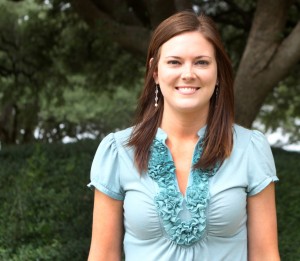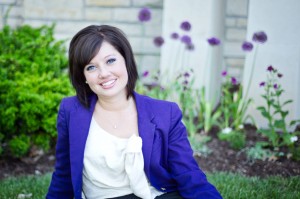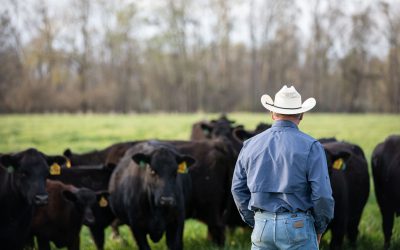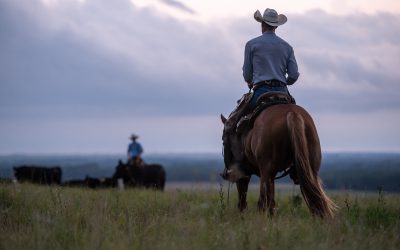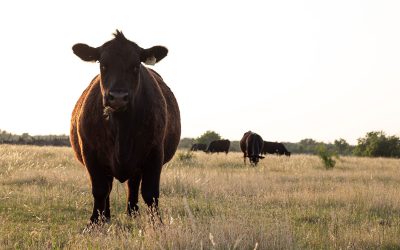Learning on the job
When Julie Vrazel stepped out at the 22,000-head Dumas Feedyard as our industry information intern in 2010, she knew she was out of her element.
“I told him straight up at the beginning of the interview, the feedyard was not my forte, but I was learning with the job, so forgive me if I ask a dumb question,” Julie recalls. Today, George Foote Jr. is still one of her favorite interviews because, “He went right along with it and gave me extra information.”
I’d wager that Chelsea Good, our 2007-08 schoolterm intern, knew more about CAB coming into the experience than any other candidate. (She says that was a combination of her background–Grandpa Fred Good was an Angus breeder—her judging team experience and some time spent researching ahead of the application). Yet she still says she had much to learn, too.
Every intern reports that talking with producers is a highlight, but for Chelsea finding out more about the end product really gave her a new appreciation for the business. She specifically remembers chatting with Garry Lawson of Macgregors Meat & Seafood. “He told me, ‘Beef is pricey, so if beef is pricey it’s got to be perfect.’ That’s really stuck with me.”
I didn’t coach her to give that answer. Honest.
Both ladies have since graduated from their undergraduates, gone on to further education and become standouts in their chosen professions, taking with them skills they’ve honed along the way.
Julie says she has always enjoyed writing and editing. (Warning: If she sees an error in your e-mail or Facebook post, she’s secretly improving your copy in her head.) That’s why her position as assistant editor with the Texas Farm Bureau is a natural fit. There she gets to work on print, radio, video and web-based projects.
“[At CAB] I had to learn to do pretty much all of these interviews via phone….I use those same skills today, carrying on a conversation on the phone with somebody I’ve never met,” Julie says.
Before her time with us, before she declared her ag comm major, before she even graduated high school, Chelsea had her sights set on law school. And according to her, the stop on that journey that included communicating to cattlemen left her better in three ways:
- Improved her ability to “write concise, accurate and compelling stories.” (Something that’s “surprisingly rare” among professionals, she notes.)
- Grew her knowledge of the beef industry
- Grew a lot as a professional
Today she is the vice president of government and industry affairs for the Livestock Marketing Association, where she focuses on how policy affects local livestock auctions (Think the Farm Bill, the Packers and Stockyards Act, USDA policy, and lots and lots of technical reading.)
You know what I really like about these two gals? (Besides the obvious that they are super-talented young women who interned with us and we all agree that we’re all the better for it, me and Steve included.) I love that they have unique passions and skill sets that they could take anywhere–editor at the New York Times or Washington Post? Anchor on CNN or Fox News? Within the realm of possibility for Julie. Famous trial lawyer? State’s attorney? No doubt within reach for Chelsea.
But, for now, they’ve chosen to make use of that talent and acquired knowledge in the ag industry.
We’re pretty lucky for that.
May your bottom line be filled with black ink,
Miranda
PS—Follow along as we continue to check back in with past interns in this Throwback Thursday series. And if you or someone you know is interested in following in their footsteps, working as an Industry Information intern, check out next year’s opportunities here. But hurry, the application deadline is Nov. 25!
You may also like
Progress from small steps
Every day is a chance to learn and get better. Thousands of others like my new friends in Alabama are taking steps to meet the shifts in consumer demand, and to know more. Small steps in the right direction can start now. Even if it’s just recording a snapshot of where you are today, a benchmark for tomorrow.
Not perfect, but working to get better
The CAB Cattleman Connection team heard its name called more than once in the virtual ceremonies, and each time came a sense of personal accomplishment, but even better: confirmation that we’re getting better at our craft. I hope that means we’re doing a better job for you.
Beefed up findings
Frank Mitloehner presents his findings on the animal ag sector’s impact on global warming. He explains how cattle counterbalance other fossil fuel sectors, proving that cattle are a solution and not a threat.

